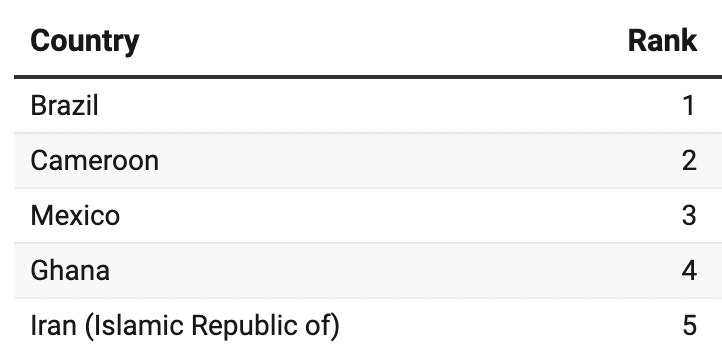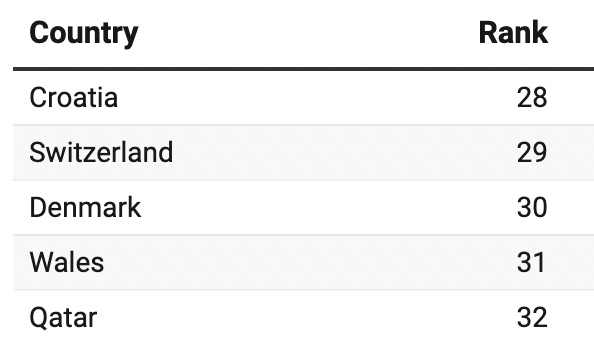Recommended
The authors of this blog will be backing England at the World Cup. But if your team isn’t at the World Cup, or if one were to support a team altruistically—which team’s victory might produce the largest total amount of happiness?
We update analysis undertaken by (new USAID chief economist) Dean Karlan to look at this question, and bring an effective altruism lens to the World Cup. We explain why altruists should favour Brazil, Cameroon or Mexico, and why Qatar ranks last in our assessment.
How should we measure the utility of a World Cup win?
Eight years ago, economist Dean Karlan produced the World Cup Utilitarian Fan Index—answering the question which team you should support if you only care about the utilitarian principle—how to create the most happiness for the most people.
This index starts with population—bigger countries have more people to enjoy a win. It adds a measure of how much people care about football. The final measure included is income—this is a familiar idea for effective altruists—a boost to income or, in this case, happiness means more to those with very few resources. Indeed, this income effect is strong—empirical and theoretical work suggests giving $100 to someone earning $1,000 a year is expected to have more than ten times the impact on utility as for someone earning $10,000 per year. By the same logic, a world cup win is likely to mean a lot more to people in a country without the resources to enjoy life in other ways.
Clearly this simple 3-factor model can’t include everything. For example, we should also consider diminishing marginal utility to wins. Are you going to be as excited about your country’s fourth World Cup win as its first? We should also expect unexpected wins to make people happier than expected wins. To be precise, economists Peter Dolton and George MacKerron calculated that unexpected wins add twice as much to happiness as expected wins. Another team of economists have shown the value of tournament wins in nation-building—which might nudge you towards picking younger or more fragile countries. We don’t include these extra considerations in our model, so you’ll have to make your own mental adjustments.
Vai Brasil?!
Brazil emerges as the nation who would benefit most on pure utility grounds, as it did in 2014, on the basis of being a very large, middle-income, and soccer-mad country. Behind Brazil are Cameroon, Mexico, Ghana, Iran, Senegal, and Morocco. A win for any of these teams could produce between a third and a half of the happiness gains from a Brazil win, but still over 10 times more total happiness than a win for England or the US.
The five countries that would get the most happiness from a World Cup win

The final ranking will also depend on how much you want to weight either unexpected or new wins. The bookies give Brazil a 20 percent chance of winning the tournament, compared to a less than 1 percent chance for Ghana. So if you think that such an unexpected win might make an individual Ghanaian 2-3 times happier than an individual Brazilian with a win (all else equal), you should go for Ghana. Cameroon, who rank second in our utility calculations, have never won the tournament. If Cameroon’s first win is worth twice as much to them as Brazil’s sixth win would, then a Cameroon win could maximize overall utility. The same is also true for Mexico who are fractionally behind in third and whose most successful quarter-final appearance (1986) was even longer ago than Cameroon’s 1990 appearance at that stage. Things could get even more complicated if we think of rivalries—an Argentinian win would arguably cause the most pain given the impact in Brazil, but we’ve left that out of our analysis.
What about the World Cup hosts?
Qatar are controversial world cup hosts—with a poor record on civil rights and political freedom (more on this below). Just in terms of our model, they rank last—there may be greater football engagement among the population hosting the competition, but its population is relatively small, and wealthy. In fact, over 80 percent of Qatar’s population are (often poorly-treated) migrants, most from South Asia—who, despite being home to nearly a quarter of the world’s population, alas have no teams in the tournament. Google searches also put cricket well ahead of football in South Asia so, taken together, there’s little case for supporting a home victory.
The five countries that would get the least happiness from a World Cup win

Altruism vs Values
You might be thinking that utilitarianism has had a bad week, with the collapse of billionaire and self-described utilitarian Sam Bankman-Fried’s crypto-currency exchange, FTX. So should we be using that approach at all? Is there a virtue ethics or deontological approach to picking World Cup teams?
If we were picking our favourite team based on what they do for the world, Sweden tops both the CGD Commitment to Development Index and the “Good Country” index—but did not unfortunately qualify for the World Cup. Runner-up in the commitment to Development Index is France; and they also deserve development plaudits for the number of migrants in their line-up. Other countries with large migrant contingents are Australia, Morocco, Tunisia, Senegal, Qatar and Wales. Or you might want to support the Netherlands, whose team have taken time out to meet with some of the migrant workers in Qatar who built the stadiums.
Gay rights have also been in the spotlight, as same-sex relations can be punishable by the death penalty in Qatar. Online magazine Outsports ranks countries by their Equality Index, and recommends against supporting teams of countries where simply being gay can result in being sentenced to death or imprisoned—these are Cameroon, Ghana, Iran, Morocco, Senegal, Saudi Arabia, Tunisia, and Qatar (coincidentally, also several of the top countries from the utilitarian index). These are reasons not to favour the leadership in a country but actually, these restrictions to human rights to people in those countries could be just another reason why those people might deserve a World Cup win.
Or perhaps you should put all thoughts of both utilitarianism and politics aside and focus on backing the best footballing team to win—judged by bookmakers to be Brazil.
Still England for us
Hopefully for us England will go all the way for the first time since 1966, and we won’t need to come to a final decision on how to weigh up all these factors. But we hope this blog gives you some food for thought on which team (or second team) you might give your support to, and also illuminate the very wide differences in the utility of a positive income or other boost for people in different countries.
You can dig into the data for the full index here.
Los autores de este blog respaldarán a Inglaterra en la Copa mundial de la FIFA Qatar 2022. Sin embargo, si tu equipo no está en la Copa del Mundo, o si uno tuviera que apoyar a un equipo de manera altruista, ¿Cuál equipo que ganase pudiese producir la mayor cantidad total de felicidad?
Actualizamos el análisis realizado por Dean Karlan (el nuevo economista jefe de USAID) para analizar esta pregunta desde un punto de vista altruista. Explicamos por qué los altruistas deberían favorecer a Brasil, Camerún o México y por qué Qatar ocupa el último lugar en nuestra evaluación.
¿Cómo deberíamos medir la utilidad de una victoria en la Copa Mundial?
Hace ocho años, el economista Dean Karlan construyó el Índice de aficionados utilitarios de la Copa Mundial (World Cup Utilitarian Fan Index), que responde a la pregunta de cual equipo deberías apoyar si solo te importa el principio utilitario: cómo crear la mayor felicidad para la mayoría de las personas.
El índice consiste en el nivel población: los países más grandes tienen más personas para disfrutar de una victoria. Después añade una medida de cuánto se preocupa la gente por el fútbol. Por último, se incluye el ingreso, este le da una idea familiar a los altruistas efectivos: un incremento en los ingresos o, en este caso, en la felicidad significa más para aquellos con muy pocos recursos. De hecho, este efecto de ingreso es fuerte: el trabajo empírico y teórico sugiere que se espera que dar $100 a alguien que gana $1000 impacte 10 veces más su utilidad que la de alguien que gane $10,000 al año. Siguiendo la misma lógica, es probable que ganar una Copa del Mundo signifique mucho más para las personas en un país sin los recursos para disfrutar la vida de otras maneras.
Claramente, este modelo simple de 3 factores no puede incluir todo. Por ejemplo, también deberíamos considerar la disminución de la utilidad marginal por triunfos. ¿Estarás tan entusiasmado con la cuarta victoria de tu país en la Copa Mundial como con la primera? También deberíamos esperar que victorias inesperadas hagan más feliz a la gente de lo esperado. Para ser precisos, los economistas Peter Dolton y George MacKerron calcularon que las victorias inesperadas aportan el doble de felicidad que las victorias esperadas. Otro equipo de economistas ha demostrado el valor que tienen las victorias de torneos en la construcción de una identidad nacional, lo que podría arrojarte a elegir países más jóvenes o frágiles. No incluimos estás consideraciones adicionales en nuestro modelo, por lo que tendrás que hacer tus propios cálculos mentales.
¡¿Vai Brasil?!
Brasil surge como la nación que se beneficiaria más por pura utilidad, como lo hizo en el 2014, basándose en ser un país muy grande, de ingresos medio y loco por el fútbol. Detrás de Brasil están Camerún, México, Ghana, Irán, Senegal y Marruecos. Una victoria para cualquiera de estos equipos podría producir entre un tercio y la mitad de las ganancias de felicidad de una victoria de Brasil, pero aun así más de 10 veces ganancias de felicidad total que una victoria de Inglaterra o EE.UU.
Los cinco países que serían más felices por una victoria en la Copa Mundial

La clasificación final también dependerá de cuánto desees ponderar las victorias inesperadas o nuevas. Los corredores de apuestas le dan a Brasil un 20 por ciento de posibilidades de ganar la copa, en comparación con menos del 1 por ciento de posibilidades para Ghana. Entonces, si crees que una victoria tan inesperada podría hacer que un ghanés sea 2 o 3 veces más feliz que un brasileño con una victoria (en igualdad de condiciones), deberías optar por irle a Ghana. Camerún, que ocupa el segundo lugar en nuestros cálculos de utilidad, nunca ha ganado el torneo. Si la primera victoria de Camerún vale el doble para ellos que la sexta victoria de Brasil, entonces una victoria de Camerún podría maximizar la utilidad general. Lo mismo es cierto para México, que está ligeramente por detrás en el tercer lugar y cuya aparición más exitosa en cuartos de final (1986) fue incluso hace más tiempo que la aparición de Camerún en 1990 en esa etapa. Las cosas podrían complicarse aún más si pensamos en las rivalidades: una victoria argentina posiblemente causaría el mayor dolor dado el impacto en Brasil, pero lo hemos dejado fuera de nuestro análisis.
¿Qué pasa con los anfitriones de la Copa del Mundo?
Qatar es un anfitrión con controversia de la copa del mundo, con un historial pobre en derechos civiles y libertad política (más sobre esto a continuación). Solo en términos de nuestro modelo, ocupan el último lugar: puede haber un mayor compromiso con el fútbol entre la población que organiza la competencia, pero su población es relativamente pequeña y rica. De hecho, más del 80 por ciento de la población de Qatar son inmigrantes (a menudo maltratados), la mayoría del sur de Asia, quienes, a pesar de ser el hogar de casi una cuarta parte de la población mundial, lamentablemente no tienen equipos en el torneo. Las búsquedas en Google también colocan al cricket muy por delante del fútbol en el sur de Asia, por lo que, en conjunto, hay pocas razones para apoyar una victoria en casa.
Los cinco países que serían menos contentos por una victoria en la Copa Mundial

Altruismo vs Valores
Podrías estar pensando que el utilitarismo ha tenido una mala semana, con el colapso de la casa cambiaria de criptomonedas FTX del multimillonario y autodenominado utilitario Sam Bankman-Fried, por lo que, ¿deberíamos usar ese enfoque? ¿Existe una ética de la virtud o un enfoque deontológico para elegir equipos de la Copa Mundial?
Si estuviéramos eligiendo a nuestro equipo favorito en función de lo que hacen por el mundo, Suecia encabeza tanto el Índice de Compromiso con el Desarrollo de CGD como el índice de "Buen País", pero desafortunadamente no clasificó para la Copa del Mundo. El subcampeón en el Índice de Compromiso con el Desarrollo es Francia; y también merecen elogios de desarrollo por la cantidad de migrantes en su line-up. Otros países con grandes contingentes de migrantes son Australia, Marruecos, Túnez, Senegal, Qatar y Gales. O tal vez quieras apoyar a los Países Bajos, cuyo equipo se ha tomado un tiempo para reunirse con algunos de los trabajadores inmigrantes en Qatar que construyeron los estadios.
Los derechos de los homosexuales también han sido el centro de atención, ya que las relaciones entre personas del mismo sexo pueden ser castigadas con la pena de muerte en Qatar. La revista en línea Outsports clasifica a los países según su índice de igualdad y recomienda no apoyar a equipos de países en los que simplemente ser homosexual puede resultar en una sentencia de muerte o encarcelamiento: estos son Camerún, Ghana, Irán, Marruecos, Senegal, Arabia Saudita, Túnez y Qatar. (casualmente, también varios de los principales países del índice utilitario). Estas son razones para no favorecer al liderazgo en un país, pero en realidad, estas restricciones a los derechos humanos de las personas en esos países podrían ser solo otra razón por la que esas personas podrían merecer una victoria en la Copa del Mundo.
O tal vez deberías dejar de lado todas las corrientes de pensamiento tanto de utilitarismo como de política y concentrarse en apoyar al mejor equipo de fútbol para ganar, considerado por los corredores de apuestas como Brasil.
Aun así le vamos a Inglaterra
Con suerte, Inglaterra llegará hasta la final por primera vez desde 1966, y no necesitaremos llegar a una decisión final sobre como ponderar todos estos factores. Sin embargo, esperamos que este blog te haga reflexionar un poco sobre a qué equipo (o segundo equipo) podrías apoyar y también destaque las amplias diferencias en la utilidad obtenida de un ingreso positivo u otro tipo de aumento para la gente en diferentes países.
Puedes profundizar los datos completos del índice aquí.
Disclaimer
CGD blog posts reflect the views of the authors, drawing on prior research and experience in their areas of expertise. CGD is a nonpartisan, independent organization and does not take institutional positions.


